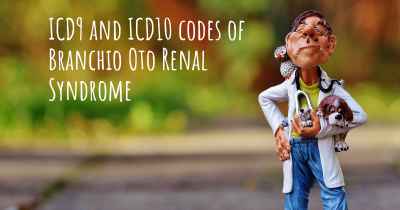What is the life expectancy of someone with Branchio Oto Renal Syndrome?
Life expectancy of people with Branchio Oto Renal Syndrome and recent progresses and researches in Branchio Oto Renal Syndrome

Branchio Oto Renal Syndrome (BOR) is a rare genetic disorder that affects the development of the ears, kidneys, and neck. The life expectancy of individuals with BOR can vary significantly depending on the severity of the condition and associated complications. While there is limited data on life expectancy specifically for BOR, it is important to note that each case is unique. Early diagnosis, appropriate medical management, and access to necessary treatments can greatly impact the prognosis and quality of life for individuals with BOR. Therefore, it is crucial for individuals with BOR to work closely with healthcare professionals to ensure comprehensive care and support.
Branchio Oto Renal Syndrome (BOR syndrome) is a rare genetic disorder that affects multiple systems in the body. It is characterized by malformations of the branchial arches, which are embryonic structures that give rise to various tissues and structures in the head and neck region. BOR syndrome primarily affects the ears, kidneys, and branchial arches, but can also involve other organs and systems.
Ear abnormalities are a hallmark feature of BOR syndrome. Affected individuals may have hearing loss, malformed or absent external ears, and malformations of the middle ear structures. The severity of ear abnormalities can vary widely among individuals with BOR syndrome.
Kidney abnormalities are another common feature of BOR syndrome. These abnormalities can range from mild kidney malformations to more severe conditions such as renal agenesis (absence of one or both kidneys). Kidney dysfunction can lead to various complications, including impaired kidney function, high blood pressure, and an increased risk of urinary tract infections.
Branchial arch abnormalities in BOR syndrome can manifest as cysts, fistulas, or sinuses in the neck region. These abnormalities are typically present at birth and may require surgical intervention to prevent recurrent infections or other complications.
Due to the wide range of symptoms and severity, it is challenging to provide a definitive answer regarding the life expectancy of individuals with BOR syndrome. The prognosis can vary significantly depending on the specific genetic mutation involved, the severity of organ involvement, and the presence of associated complications.
Some individuals with BOR syndrome may have relatively mild symptoms and lead relatively normal lives with appropriate medical management. Others may experience more severe complications that can impact their overall health and life expectancy.
Early diagnosis and intervention are crucial in managing BOR syndrome. A multidisciplinary approach involving various medical specialists, such as otolaryngologists, nephrologists, and geneticists, is often necessary to provide comprehensive care.
Treatment for BOR syndrome focuses on managing the specific symptoms and complications associated with the disorder. This may include hearing aids or other assistive devices for hearing loss, surgical interventions for ear or branchial arch abnormalities, and ongoing monitoring and management of kidney function.
It is important to note that BOR syndrome is a lifelong condition, and individuals with the disorder require regular medical follow-up to monitor their health and manage any potential complications. With appropriate medical care and support, many individuals with BOR syndrome can lead fulfilling lives.
In conclusion, the life expectancy of someone with Branchio Oto Renal Syndrome cannot be definitively determined due to the wide variability in symptoms and severity. It is essential for individuals with BOR syndrome to receive early diagnosis, appropriate medical management, and ongoing care from a multidisciplinary team of specialists to optimize their overall health and well-being.
Posted Aug 9, 2017 by Sylvie 1000








